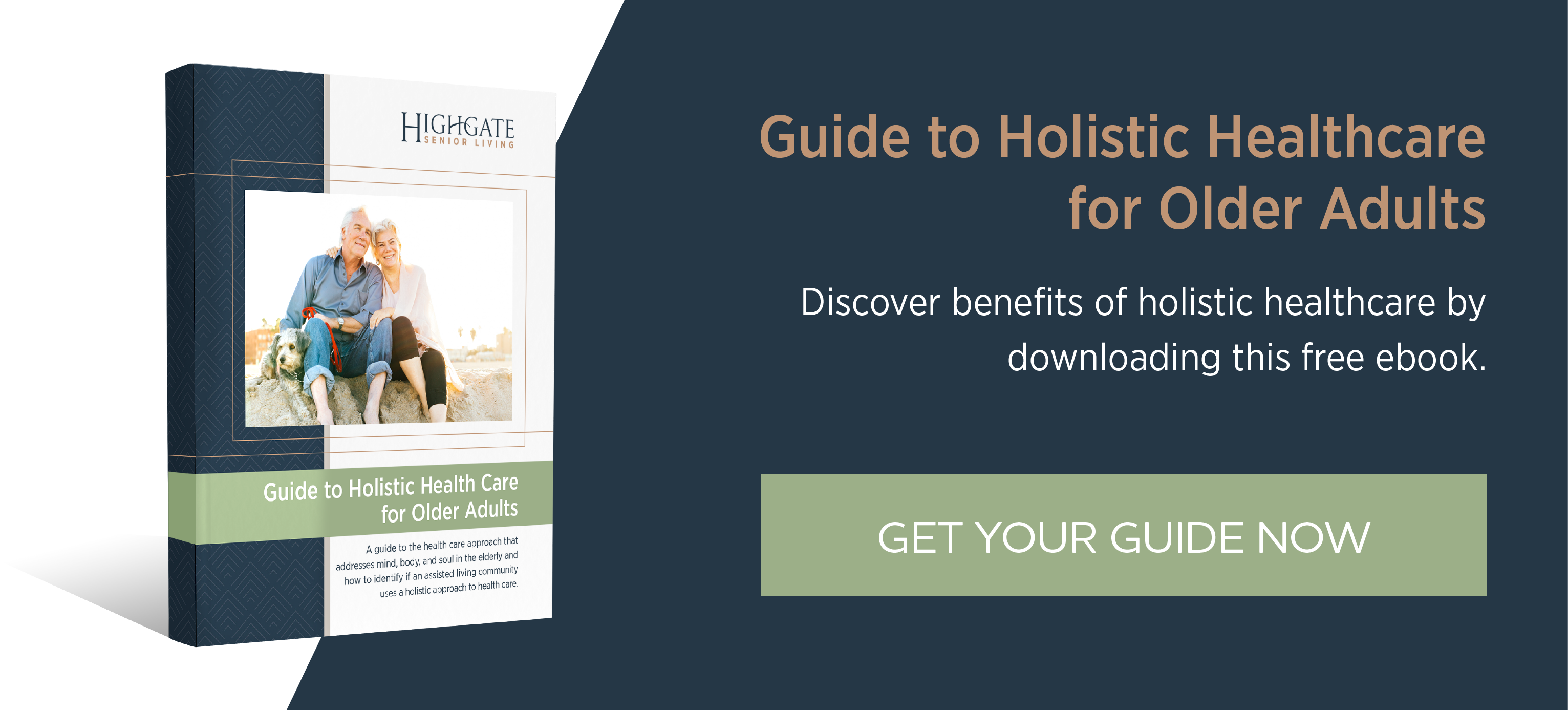
If you are a family caregiver for an aging loved one, you might have heard the phrase “aging in place.” Aging in place is a general term used to describe a person living in the residence of their choice for as long as they are able.
Although many assume aging in place only happens at home, it’s a core concept of the philosophy of a few innovative assisted living facilities. For example, at Highgate Senior Living, the team members adjust their level of care criteria to meet residents’ changing needs and to avoid having to discharge individuals to a higher level of care prematurely.
Unfortunately, not all assisted living facilities adopt the aging in place model. For example, some adult children find that there’s a big gap between what their parents need and what many assisted living facilities are equipped to do. They find themselves still coordinating, managing, and worrying about many aspects of their parents’ health care.
Holistic Care
At Highgate Senior Living communities, the care partners recognize not only the health care needs of residents but also their emotional, spiritual, and mental needs, too. And the team members respond with new programs that combine traditional services (such as meals) with things like onsite medical management, aromatherapy, massage, nutritional support, and socialization.
“Holistic care is one of the cornerstones of our practice,” says Vanessa Rauser, a registered nurse and the health care director at Highgate at Bozeman. “Our physical state affects our spiritual state, and our spiritual state affects our mental state. When out of balance, spiritual or mental states can cause physical ailments, such as pain or decreased mobility. Physical symptoms can cause poor long-term outcomes.
“Highgate has offerings to help with mind, body, and spirit,” Rauser continues. “The holistic approach increases health, and with the increased health we can support our residents while they live an active, long life in good health.”
Here’s a look a few other ways Highgate’s higher level of care keeps residents aging in place in assisted living longer.
Highgate Assigns Preferred Care Partners
Highgate places a high value on the relationships that form between care partners and residents. The close bond care partners and residents form directly impacts each resident’s physical, mental, and emotional well-being. For this reason, Highgate assigns a preferred care partner to the same group of residents every day.
“Care by nature is an intimate process,” Rauser says. “Highgate uses preferred care partners so that our residents can bond and feel more comfortable while that care is being completed. A preferred care partner is partnered with each resident so that the same person is routinely completing the same tasks. The team can really understand how a resident wants the task to be completed. Having a preferred care partner reduces anxiety and allows the resident to have confidence that the care partner will know exactly how the task should be completed because they have done it many times before.”
Care Partners Are Trained to Handle Complex Medical Issues
When a higher level of care is called for, Highgate’s team of clinical professionals step in to help. They can handle almost anything, even complex medical issues and severe cognitive impairment.
Services and care tasks may include:
- Infection control
- A positive approach to dementia care,
- Vital signs
- Laundry
- Skin care
- Emergency response
- Responding
- Oxygen assistance
- Diabetic monitoring
- Ostomy care
“We have a comprehensive program to train our team,” Rauser says. “We train our care team on basic care tasks as well as specific tasks for each of the residents that they will be assisting. It’s not a cookie-cutter plan for all of our residents.”
Highgate Offers Full Care for All
Highgate understands that no two residents are alike, each with individual life stories, unique interests, different health challenges, and needs. The full-care-for-all approach means each person receives as much care as they want and not more than they need.
“One of the reasons that people may choose to move into Highgate is a decreased ability to complete activities of daily living independently,” Rauser says. Decreased ADL ability can lead to poor hygiene, decreased nutrition, and depression. When a resident moves into Highgate and has help with ADLs, they can begin to restore hygiene and mobility back to baseline. With proper nutrition and socialization, there can be a decrease in signs of depression. Often times, people have a small ‘bounce back’ to increased independence and satisfaction.”
Because services are personalized to meet individual needs, Highgate residents can remain as independent as possible, for as long as possible. Yet they have access to the care they require at a moment’s notice.
For more information about how Highgate helps seniors live each day to the fullest, download our guide to Highgate Senior Living’s Unique Approach to Senior Care. It will give you a glance into the team members, programs and our unique approach to assisted living and memory care.







